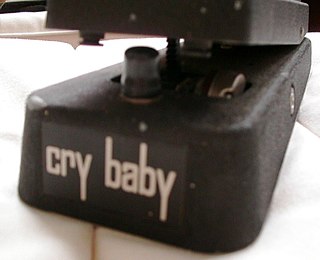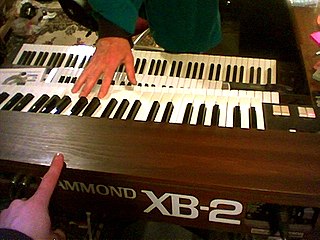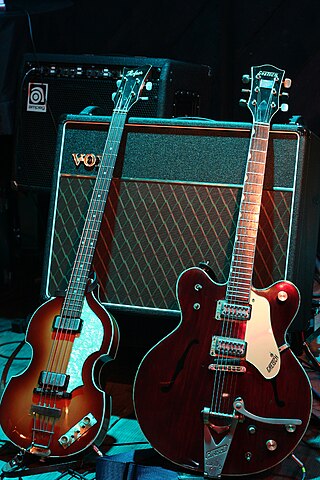Related Research Articles

Vox is a British musical equipment manufacturer founded in 1957 by Thomas Walter Jennings in Dartford, Kent, England. The company is most famous for making the Vox AC30 guitar amplifier, used by The Beatles, The Rolling Stones, The Kinks, The Yardbirds, Queen, Dire Straits, U2, and Radiohead; the Vox Continental electric organ, the Vox wah-wah pedal used by Jimi Hendrix, and a series of innovative electric guitars and bass guitars. Since 1992, Vox has been owned by the Japanese electronics firm Korg.

KORG Inc., founded as Keio Electronic Laboratories, is a Japanese multinational corporation that manufactures electronic musical instruments, audio processors and guitar pedals, recording equipment, and electronic tuners. Under the Vox brand name, they also manufacture guitar amplifiers and electric guitars.

A wah-wah pedal, or simply wah pedal, is a type of effects pedal designed for electric guitar that alters the timbre of the input signal to create a distinctive sound, mimicking the human voice saying the onomatopoeic name "wah-wah". The pedal sweeps a band-pass filter up and down in frequency to create a spectral glide. The wah-wah effect originated in the 1920s, with trumpet or trombone players finding they could produce an expressive crying tone by moving a mute in, and out of the instrument's bell. This was later simulated with electronic circuitry for the electric guitar when the wah-wah pedal was invented. It is controlled by movement of the player's foot on a rocking pedal connected to a potentiometer. Wah-wah effects may be used without moving the treadle as a fixed filter to alter an instrument’s timbre, or to create a "wacka-wacka" funk-styled rhythm for rhythm guitar playing.
Farfisa is a manufacturer of electronics based in Osimo, Italy, founded in 1946. The company manufactured a series of compact electronic organs in the 1960s and 1970s, including the Compact, FAST, Professional and VIP ranges, and later, a series of other keyboard instruments. They were used by a number of popular musicians, including Sam the Sham, Country Joe and the Fish, Pink Floyd, Sly Stone, Blondie, Suicide and the B-52s.

Guitar Organ or GuitOrgan is a type of electric guitar with electronic organ components added, developed by Jennings Musical Industry as Vox Guitar Organ at latest in 1965. Similar instrument, GuitOrgan was developed by Murrell Electronics, circa 1967. On this type of instruments, each guitar fret is separated into six segments, creating independent contact switches for each string. The organ notes are keyed when a string touches a specific segment. An expression pedal is used to fade the organ sound in and out, while the guitar can be played at the same time.
Silvertone is a brand created and promoted by Sears for its line of consumer electronics and musical instruments from 1916 to 1972.
Teisco was a Japanese musical instrument manufacturing company from 1948 until 1967, when the brand "Teisco" was acquired by Kawai. The company produced guitars as well as synthesizers, microphones, guitar amplifiers and drum kits. Teisco products were widely exported to the United States and the United Kingdom.

A clonewheel organ is an electronic musical instrument that emulates the sound of the electromechanical tonewheel-based organs formerly manufactured by Hammond from the 1930s to the 1970s. Clonewheel organs generate sounds using solid-state circuitry or computer chips, rather than with heavy mechanical tonewheels, making clonewheel organs much lighter-weight and smaller than vintage Hammonds, and easier to transport to live performances and recording sessions.
A music store or musical instrument store is a retail business that sells musical instruments and related equipment and accessories. Some music stores sell additional services, such as music lessons, music instrument or equipment rental, or repair services.

Ace Electronic Industries Inc., or Ace Tone, was a manufacturer of electronic musical instruments, including electronic organs, analogue drum machines, and electronic drums, as well as amplifiers and effects pedals. Founded in 1960 by Ikutaro Kakehashi with an investment by Sakata Shokai, Ace Tone can be considered an early incarnation of the Roland Corporation, which was also founded by Kakehashi. Ace Tone began manufacturing amplifiers in 1963.

The Vox AC30 is a guitar amplifier manufactured by Vox. It was introduced in 1958 to meet the growing demand for louder amplifiers. Characterised by its "jangly" high-end sound it has become widely recognized by British musicians and others, such as George Harrison and John Lennon of the Beatles, Bill Wyman of the Rolling Stones, Brian May of Queen, Dave Davies of the Kinks and Hank Marvin.

The Vox Continental is a transistorised combo organ that was manufactured between 1962 and 1971 by the British musical equipment manufacturer Vox. It was designed for touring musicians and as an alternative to the heavy Hammond organ. It supports drawbars in a similar manner to the Hammond, and has distinctive reverse-coloured keys. The sound is generated by a series of oscillators, using a frequency divider to span multiple octaves.
Jennings Musical Instruments is a manufacturer of musical instruments, and the original owner of the Vox brand. The company was founded by Thomas Walter Jennings.

Kay Musical Instrument Company is an American musical instrument manufacturer established in 1931 by namesake Henry "Kay" Kuhrmeyer and based in Chicago, Illinois. It was formed when Kuhrmeyer bought out his financial backers in the instrument manufacturer Stromberg-Voisinet. They produced guitars, mandolins, banjos, ukuleles and were known for their use of lamination in the construction of arched top instruments.
Viscount International SpA (Viscount) is a musical instrument manufacturer based in Mondaino, Italy. The brand Viscount was registered in 1969 by Marcello Galanti, but the company was established in the late 19th century by his forefather Antonio Galanti. After 1969 Viscount's primary focus has been on classic organs and digital pianos. Several alternative brands were formed in the 2000s to aim at expanding into other markets: VERSE and Voice Systems, respectively, for the high and low-end Pro-Audio markets and Physis for digital organs using Viscount's physical modeling technology. The company also used the Oberheim brand for several years, to market vintage organs, synthesizers and guitar effects. Currently, Viscount's manufacturing and R&D activity is based in Italy. The company has been continuously owned by the Galanti family since its inception.
Valco was a US manufacturer of guitar amplifiers from the 1940s through 1968.
Vintage Guitar is an American magazine that focuses on vintage and classic guitars, amplifiers, effects, and related equipment, as well as notable guitarists from all genres and eras. The publication's feature stories and monthly columns cover a diverse range of topics by contributors, including some of the biggest names in the industry and renowned authorities like Dan Erlewine, George Gruhn, Wolf Marshall, Richard Smith, and Seymour W. Duncan, as well as some of the best-known writers in the field, including Pete Prown, Walter Carter, Dan Forte, Dave Hunter, Rich Kienzle, Michael Dregni, John Peden, Greg Prato, and others.
Del Casher is an American guitarist and inventor. He invented the wah-wah pedal, the Ecco-Fonic, and the Fender Electronic Echo Chamber. He was the first to introduce the Roland Guitar Synthesizer for the Roland Corporation.
The Vox AC50 is a guitar amplifier head and accompanying speaker cabinet manufactured by Vox. It was introduced in 1964 to meet the growing demand for louder amplifiers during the British Invasion era of rock and roll live performances. Most notable performers that used the AC50 was The Beatles as well as several other British pop rock bands during the mid to late 60's.
References
- Hunter, Dave, "50 Years of Vox", Vintage Guitar magazine, 16 February 2010 (This article originally appeared in Vintage Guitar's November 2007 issue)